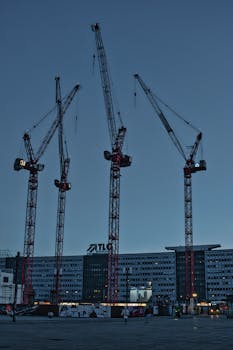+17162654855
+17162654855
DMV Publication News serves as an authoritative platform for delivering the latest industry updates, research insights, and significant developments across various sectors. Our news articles provide a comprehensive view of market trends, key findings, and groundbreaking initiatives, ensuring businesses and professionals stay ahead in a competitive landscape.
The News section on DMV Publication News highlights major industry events such as product launches, market expansions, mergers and acquisitions, financial reports, and strategic collaborations. This dedicated space allows businesses to gain valuable insights into evolving market dynamics, empowering them to make informed decisions.
At DMV Publication News, we cover a diverse range of industries, including Healthcare, Automotive, Utilities, Materials, Chemicals, Energy, Telecommunications, Technology, Financials, and Consumer Goods. Our mission is to ensure that professionals across these sectors have access to high-quality, data-driven news that shapes their industry’s future.
By featuring key industry updates and expert insights, DMV Publication News enhances brand visibility, credibility, and engagement for businesses worldwide. Whether it's the latest technological breakthrough or emerging market opportunities, our platform serves as a bridge between industry leaders, stakeholders, and decision-makers.
Stay informed with DMV Publication News – your trusted source for impactful industry news.
Industrials

ArcelorMittal, the world's leading steel and mining company, has announced the indefinite halt of its ambitious electric arc furnace (EAF)/direct reduced iron (DRI) project in Asturias, Spain. This decision sends shockwaves through the European steel industry, raising serious questions about the continent's commitment to decarbonizing its steel production and its implications for the future of green steel. The project's cancellation is a significant setback for the region's economic development and its broader sustainability goals.
The abandoned project, initially planned for a significant investment, aimed to modernize ArcelorMittal's operations in Asturias, replacing blast furnaces with more environmentally friendly EAF/DRI technology. This transition was crucial for the company to meet increasingly stringent European Union emission reduction targets and compete in the growing market for sustainable steel. The EAF/DRI process uses significantly less coal than traditional blast furnaces, thereby reducing carbon dioxide emissions. The project was seen as a flagship initiative demonstrating the viability of low-carbon steel production in Europe.
ArcelorMittal has cited a confluence of factors for the decision to halt the project. While the company hasn't explicitly stated a single cause, industry analysts point to several contributing elements:
Soaring Energy Prices: The unprecedented surge in energy costs across Europe, particularly electricity prices, has significantly increased the operational costs of EAF/DRI plants. These plants are heavily reliant on electricity, making them vulnerable to volatile energy markets. The unpredictable nature of energy pricing created significant financial uncertainty, deterring ArcelorMittal from proceeding with the project.
Inflation and Supply Chain Disruptions: Global inflation and ongoing supply chain disruptions have added further pressure to the project's already challenging economics. The increased cost of raw materials, equipment, and skilled labor has made the project's financial viability even more questionable.
Permitting Delays and Regulatory Hurdles: While not explicitly stated as the primary reason, bureaucratic hurdles and potential permitting delays inherent in large-scale industrial projects in Europe are also likely factors that contributed to the decision. Navigating complex regulatory landscapes adds to project timelines and overall costs.
Competition and Market Dynamics: The intense competition within the global steel market and shifting demand patterns also played a role. The evolving market landscape forced ArcelorMittal to reassess its investment priorities, ultimately leading to the suspension of the Asturias project.
The suspension of this significant project casts a long shadow over the European steel industry's decarbonization efforts. It highlights the considerable challenges involved in transitioning away from carbon-intensive production methods, particularly in the face of economic headwinds. The decision raises questions about:
The feasibility of large-scale green steel initiatives: The project's failure raises concerns about the economic viability of ambitious green steel projects in Europe, particularly in the current economic climate.
Government support for green steel: The incident underscores the need for stronger government support and policies to incentivize the adoption of sustainable steel production technologies. This includes financial incentives, streamlined regulatory processes, and long-term policy certainty.
Europe's competitiveness in the global steel market: The delay in green steel development could put European steel producers at a disadvantage compared to regions with less stringent environmental regulations or lower energy costs.
Job security in the steel sector: The project's cancellation poses concerns about job security in Asturias and could impact wider employment within the European steel industry.
Despite this setback, the transition to sustainable steel production in Europe remains a critical goal. The long-term benefits of reducing carbon emissions and creating a more environmentally friendly steel industry outweigh the short-term challenges. Moving forward, several crucial steps are needed:
Strengthened policy support: Governments must provide more robust financial incentives and streamline permitting processes to encourage investment in green steel technologies.
Investment in research and development: Continued investment in research and development is vital to improving the efficiency and reducing the costs of green steel technologies.
Collaboration across the value chain: Effective collaboration between steel producers, technology providers, and policymakers is essential to accelerate the transition to green steel.
Carbon pricing mechanisms: Implementing effective carbon pricing mechanisms can create a level playing field and incentivize the adoption of low-carbon technologies.
The ArcelorMittal decision underscores the complexities of achieving a sustainable steel industry. However, it also serves as a crucial wake-up call, highlighting the need for a more concerted and strategically focused approach to decarbonizing European steel production. The future of green steel in Europe depends on addressing the challenges highlighted by this significant project cancellation and fostering a more supportive environment for sustainable innovation. The focus now shifts to finding alternative strategies to ensure the European steel industry remains competitive while minimizing its environmental impact and achieving the ambitious goals of the European Green Deal.